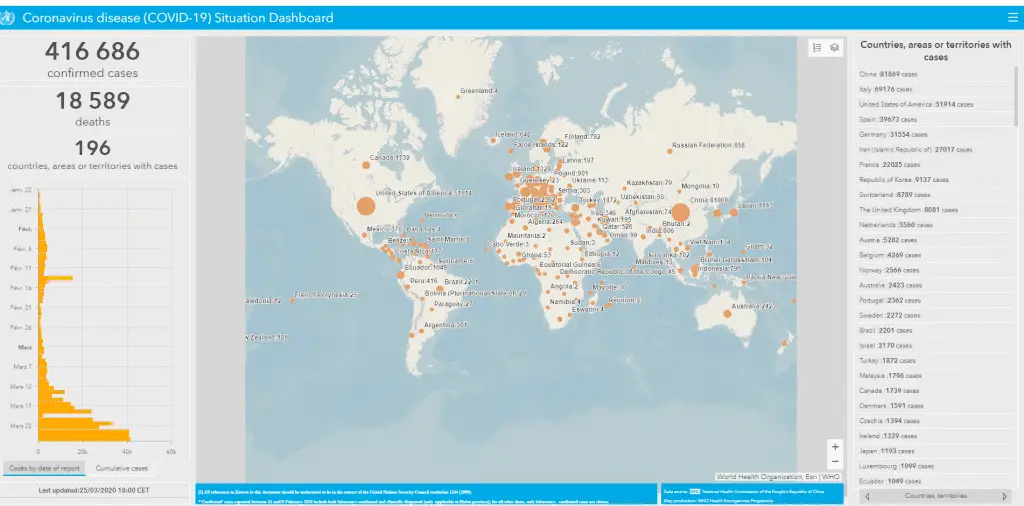Travelling to the Schengen Area despite the COVID-19 Coronavirus

The latest information
- What is the Coronavirus?
- Coronavirus Transmission, symptoms and recommendations
- The latest statistics for the most visited Schengen countries: confirmed cases and deaths
- Quarantine and event cancellations
- Coronavirus – Europe Travel & Covid-19 Updates
- Reinforcing health measures at the Schengen borders
- Cancellation of flights: the new flexible EU rules
- Travel insurance coverage for the Coronavirus
- Cooperation and research in Europe
- Official resources for the public on COVID-19
What is the Coronavirus?
The real name of the virus is SARS-CoV-2 for Severe Acute Respiratory Syndrome Coronavirus 2, responsible for the COVID-19 disease.
Coronavirus Transmission, Symptoms and Recommendations
The coronavirus has been first transmitted by animals to people (the scientists are still unsure if pangolins or bats are responsible for it) but it is now transmitted from person-to-person. However, there is still no evidence that you can catch coronavirus from pets.
The Coronavirus symptoms are very close to the flu symptoms (WHO data):
- Fever 88% of cases
- Cough: dry 68%, with mucus 33% of cases
- Shortness of breath and breathing difficulties 19% of cases
- Pain in the muscles and tiredness 38%
- Headaches: 14% of cases
In the most severe cases (20% of cases): pneumonia due to infection, severe acute respiratory syndrome, kidney failure and death
Incubation period: to 6 days to up to 14 days

In order to prevent germs for spreading, you should:
- Wash your hands with soap and water (at least 20 seconds) or use hand sanitizer
- Cover mouth and nose when coughing and sneezing (not doing it in your hands) – catch it in a tissue and bin it straight away.
- Thoroughly cook meat and eggs
- Avoid touching your nose, eyes, mouth if your hands are not clean
- Avoid close contact with people suffering from ARI (at least 3 feet distance between yourself and anyone else who is sick. This has now been advised to extend to 2 meters distance between you)
- Throw tissue into closed bin immediately after use
- Don’t wear a surgical mask if you are not sick (N95 masks are the right ones: use it for a maximum of 8 hours).
If you get infected, the symptoms will generally appear after 5 to 6 days, but you are already contagious a few days before. It seems that people under the age of 20 don't have significant symptoms or could be asymptomatic.
The latest coronavirus statistics for the Schengen countries and the UK: confirmed cases, deaths and recoveries
(Last update, March 27, 2020)
For now, more than 537,881 reported cases of COVID-19 in 199 countries and territories. The list of cases of COVID-19 in the Schengen zone and Europe below are organised by the highest number of confirmed cases. As a benchmark, please note that China, the first infected country, has had 81,340 confirmed cases 3,292 deaths, 74,588 recovered. Compared to the USA, which was one of the most recent western countries, currently has 85,612 confirmed cases 1,301 deaths, 1,868 recovered and is well on course to be the worst affected country.
- Italy: 80,589 confirmed cases 8,215 deaths, 10,361recovered
- Spain: 57,786 confirmed cases 4,365 deaths, 7,015 recovered
- Germany: 47,278 confirmed cases, 281 deaths, 5,673 recovered
- France: 29,155 confirmed cases, 1,696 deaths, 4,948 recovered
- Switzerland: 11,811 confirmed cases 194 deaths, 131 recovered
- UK: 11,658 confirmed cases, 578 deaths, 135 recovered
- Netherlands: 7,431 confirmed cases 434 deaths, 3 recovered
- Austria: 6,962 confirmed cases 49 deaths 112 recovered
- Belgium: 6,235 confirmed cases 220 deaths, 675 recovered
- Portugal: 3,544 confirmed cases 60 deaths, 43 recovered
- Norway: 3,372 confirmed cases 14 deaths, 6 recovered
- Sweden: 2,840 confirmed cases 77 deaths, 16 recovered
- Czech Republic: 2,062 confirmed cases 9 deaths, 10 recovered
- Denmark: 1,877 confirmed cases, 41 deaths, 1 recovered
- Ireland: 1,819 confirmed cases, 19 deaths, 5 recovered (not a Schengen state)
- Luxembourg: 1,453 confirmed cases 9 deaths, 6 recovered
- Poland: 1,244 confirmed cases 16 deaths, 7 recovered
- Finland: 958 confirmed cases, 5 deaths, 10 recovered
- Greece: 892 confirmed cases 27 deaths, 42 recovered
- Iceland: 802 confirmed cases 2 deaths, 82 recovered
- Slovenia: 562 confirmed cases, 6 deaths, 10 recovered
- Estonia: 538 confirmed cases, 1 deaths, 8 recovered
- Lithuania: 345 confirmed cases, 4 deaths, 1 recovered
- Hungary: 300 confirmed cases, 10 deaths, 34 recovered
- Latvia: 244 confirmed cases, – deaths, 1 recovered
- Slovakia: 226 confirmed cases, – deaths, 2 recovered
- Malta: 134 confirmed cases, – deaths, 2 recovered
- Liechtenstein: 56 confirmed cases, – deaths, – recovered
- San Marino: 208 confirmed cases, 21 deaths, 4 recovered
- Monaco: 33 – 1
[su_spoiler title=”Other EU Countries:” style=”fancy” icon=”folder-2″]
- Romania: 1,029 confirmed cases, 24 deaths, 94 recovered
- Croatia: 495 confirmed cases, 3 deaths, 22 recovered
- Serbia: 457 confirmed cases, 7 deaths, 15 recovered
- Bulgaria: 276 confirmed cases, 3 deaths, 8 recovered
- Ukraine: 218 confirmed cases, 5 deaths, 4 recovered
- North Macedonia: 201 confirmed cases, 3 deaths, 3 recovered
- Tunisia: 197 confirmed cases, 5 deaths, 2 recovered
- Bosnia and Herzegovina: 191 confirmed cases, 2 deaths, 5 recovered
- Moldova: 177 confirmed cases, 2 deaths, 2 recovered
- Albania: 174 confirmed cases, 7 deaths, 17 recovered
- Cyprus: 146 confirmed cases, 3 deaths, 4 recovered
- Faroe Islands: 140 confirmed cases, – deaths, 54 recovered
- Belarus: 86 confirmed cases, – deaths, 29 recovered
- Georgia: 81 confirmed cases, – deaths, 13 recovered
- Gibraltar: 35 confirmed cases, – deaths, 13 recovered
- Isle of Man: 26 confirmed cases, – deaths, – recovered
- Greenland: 9 confirmed cases, – deaths, 2 recovered
[/su_spoiler]

According to the WHO, around 3.4% of reported COVID-19 cases have died.
However, there is a huge gap in the death rate that varies by age, health and sex. There is a 5 to 15% risk for 70 to 80+ years old people, and/or people with Hypertension, Respiratory disease, Diabetes or Cardiovascular conditions. Men have a higher mortality rate than women (Males are a little more willing to die than women).
Younger adults and people under 20 years of age seem fortunate to be less infected and the illness less severe.
UPDATE: The numbers of infections kept rising over the spring and started to be understood over the summer, with a drop in infections and deaths from the virus. With the US topping the numbers of infections and the UK being worst hit out of the European countries. The coronavirus numbers has been widely tracked.
As early as July, countries such as Germany were predicting a second wave of coronavirus after largely getting the numbers under control over the summer. The prediction came to fruition as all of Europe started to record the second wave of increasing numbers of coronavirus infections.
This led to almost all European countries and worldwide start to introduce the second round of lockdowns in the hope that they can get the numbers under control over the Christmas and New Year holidays. Unfortunately, countries, like the UK, had to return back to lockdowns before Christmas and others lightly loosened restrictions for a limited time and limited periods over Christmas.
Quarantine and event cancellations
After a G7 video conference, the G7 leaders decided to close the EU borders to all non-essential travel for 30 days to contain the spread of coronavirus.
Belgium: although “no lockdown” is in place, schools, cafes, restaurants and some shops are ordered to close until 3rd April 2020.
Czech Republic: Ban on all travel to the Czech Republic by all foreign nationals. Additionally, all Czech nationals are also banned from exiting the country from 16 March 2020. Special exemptions are in place for truck drivers, diplomats and commuters that live or work 50km from the borders of Germany and Austria
Denmark: All travel to Denmark by foreign citizens. From midday on 14th March 2020, only Danish citizens are permitted to enter Denmark. All foreign nationals who cannot prove a credible reason to enter Denmark will be refused. Only supplies allowed into the country.
France: the events and all gatherings of more than 100 people in attendance are banned. Schools and universities are closed in some parts of the country (Oise, Rhin and Corsica).
From March 17, 2020 midday, a 15-day lockdown will apply with restrictions on people's movement: 100,000 police officers will be deployed to enforce the lockdown.
Germany: closure of all theatres, concert halls and opera houses in Berlin and cancellation of even of more than 1,000 people in attendance.
Religious services have been banned and Angela Merkel asked germans to cancel their holiday travels, even inside the country.
Greece: All museums and attractions closed until the end of the month. Schools, theatres, cinemas and gyms are closed as well as all public gatherings. The remainder of the Olympic torch relay has also been suspended.
Italy: the quarantine is extended to the entire country and the government recently asked to close all stores except pharmacies and groceries.
Latvia: All public gatherings of over 50 people banned with immediate effect on the 14th March 2020. Only Latvian nationals and those with residency permits are permitted to enter Latvia. Only non-nationals will be able to leave Latvia from 17th March 2020..
Poland: Bans on all travel to Poland except Polish nationals. Returning nationals to face 14 days quarantine. Certain shops in shopping malls to be closed. Restaurants, bars and casinos to be closed and public gatherings reduced to 50 or less.
Portugal: All schools shut until further notice til 9th April 2020. Nightclubs also to be shut and restrictions are put into place for entry into shopping malls
Spain: Schools and universities in Madrid and Victoria are closed. State of emergency declared. All bars and clubs are closed. Curfew put in place in Catalonia.
There is now a partial lockdown for 15 days (started on Saturday March 14th).
Switzerland: Gatherings of 100 or more people have been banned. Restaurants & bars must not exceed 50 people and remain apart. Schools to be closed, unless there are less than 50 students, and depending on the administrative area. Border controls have been re-introduced and people can no longer automatically enter Switzerland from the Swiss-Italian border. Only Swiss nationals, residence permit holders, cross border workers and deliveries can cross. People have been requested to reduce social interactions and to stay away from people over 65 and those with underlying health conditions. Parents have been asked not to use grandparents to look after their children to reduce the risk of infection.
To help businesses, measures for unemployment, payroll support and government loan funds and loan guarantees have been set up for struggling businesses.
Coronavirus – Europe Travel & COVID-19 Updates
[su_spoiler title=”Europe Coronavirus Update: Wednesday 1 April 2020:” style=”fancy” icon=”folder-2″]
- The death toll from covid-19 now surpass 42,000
[/su_spoiler]
[su_spoiler title=”Europe Coronavirus Update: Tuesday 31 March 2020:” style=”fancy” icon=”folder-2″]
- A new diagnostic test for the Covid-19 that can deliver results within minutes has been approved by the U.S. Food and Drug Administration
- France, Spain and the UK reported their highest single-day death toll with respectively 418, 849 and 381 deaths
- However, the growth of coronavirus confirmed cases in Spain seems to be slowing
- 8 african countries reported deaths due to coronavirus for the first time
[/su_spoiler]
[su_spoiler title=”Europe Coronavirus Update: Monday 30 March 2020:” style=”fancy” icon=”folder-2″]
For now, more than 741,907 reported cases of COVID-19 in 199 countries and territories. The list of cases of COVID-19 in the Schengen zone and Europe below are organised by the highest number of confirmed cases. As a benchmark, please note that China, the first infected country, has had 81,470 confirmed cases 3,304 deaths, 75,700 recovered. Compared to the USA, which was one of the most recent western countries, currently has 144,410 confirmed cases 2,600 deaths, 4,573 recovered and is well on course to be the worst affected country.
- Italy: 97,689 confirmed cases 10,779 deaths, 13,030 recovered
- Spain: 85,195 confirmed cases 7,340 deaths, 16,780 recovered
- Germany: 63,929 confirmed cases, 560 deaths, 9,211 recovered
- France: 40,174 confirmed cases, 2,606 deaths, 7,202 recovered
- Switzerland: 15,526 confirmed cases 333 deaths, 1,823 recovered
- UK: 19,522 confirmed cases, 1,415 deaths, 135 recovered
- Netherlands: 11,750 confirmed cases 864 deaths, 250 recovered
- Austria: 9,377 confirmed cases 108 deaths 636 recovered
- Belgium: 11,899 confirmed cases 513 deaths, 1,527 recovered
- Portugal: 6,408 confirmed cases 140 deaths, 43 recovered
- Norway: 4,393 confirmed cases 31 deaths, 12 recovered
- Sweden: 4,028 confirmed cases 146 deaths, 16 recovered
- Czech Republic: 2,878 confirmed cases 17 deaths, 11 recovered
- Denmark: 2,555 confirmed cases, 77 deaths, 1 recovered
- Ireland: 2,615 confirmed cases, 46 deaths, 5 recovered (not a Schengen state)
- Luxembourg: 1,988 confirmed cases 9 deaths, 6 recovered
- Poland: 1,244 confirmed cases 22 deaths, 40 recovered
- Finland: 1,352 confirmed cases, 13 deaths, 10 recovered
- Greece: 1,156 confirmed cases 41 deaths, 52 recovered
- Iceland: 1,020 confirmed cases 2 deaths, 135 recovered
- Slovenia: 756 confirmed cases, 11 deaths, 10 recovered
- Estonia: 715 confirmed cases, 3 deaths, 20 recovered
- Lithuania: 484 confirmed cases, 7 deaths, 1 recovered
- Hungary: 447 confirmed cases, 15 deaths, 34 recovered
- Latvia: 376 confirmed cases, – deaths, 1 recovered
- Slovakia: 336 confirmed cases, – deaths, 7 recovered
- Malta: 156 confirmed cases, – deaths, 2 recovered
- Liechtenstein: 62 confirmed cases, – deaths, – recovered
- San Marino: 230 confirmed cases, 25 deaths, 13 recovered
- Monaco: 46 confirmed cases, 1 death, 1 recovered
[/su_spoiler]
[su_spoiler title=”Europe Coronavirus Update: Sunday 29 March 2020:” style=”fancy” icon=”folder-2″]
- President Trump considers closing the entire state of New York
[/su_spoiler]
[su_spoiler title=”Europe Coronavirus Update: Saturday 28 March 2020:” style=”fancy” icon=”folder-2″]
- Ireland is on lockdown for at least two weeks
- President Putin asked russian citizens to stay at home and cafes, restaurants and shops in Moscow will be closed until April 5th
[/su_spoiler]
[su_spoiler title=”Europe Coronavirus Update: Friday 27 March 2020:” style=”fancy” icon=”folder-2″]
- China has suspended the entry of foreign nationals (even if they have resident permits or visas or are returning Chinese nationals)
- France extends lockdown measures until April 15, 2020
- Hungary is on national lockdown for two weeks
[/su_spoiler]
[su_spoiler title=”Europe Coronavirus Update: Thursday 26 March 2020:” style=”fancy” icon=”folder-2″]
- The UK government has published an Official Guidance about “Staying at home and away from others (social distancing).
- South Africa is on lockdown for 21 days
[/su_spoiler]
[su_spoiler title=”Europe Coronavirus Update: Wednesday 25 March 2020:” style=”fancy” icon=”folder-2″]
- New restrictions in Australia: no gathering of more than 10 people are allowed, no overseas travel and entertainment centres and pools are closed
- New Zealand is on national lockdown for 1 month
- Ridayh, the capital of Saudi Arabia, is under lockdown
[/su_spoiler]
[su_spoiler title=”Europe Coronavirus Update: Tuesday 24 March 2020:” style=”fancy” icon=”folder-2″]
- Non essentials shops in Ireland are now closed and social distancing is encouraged
- the Swiss government asked peope to sty at home and gathering of more than 5 people are not allowed (until April 19)
- Croatia closed its borders to third-country nationals
- Colombia is on national lockdown for 19 days
- India is under lockdown for 21 days
[/su_spoiler]
[su_spoiler title=”Europe Coronavirus Update: Monday 23 March 2020:” style=”fancy” icon=”folder-2″]
- Denamark's Prime Minister annouced a two-week extension to its COVID-19 restrictions.
- Greece is on lockdown
- Italy sees a second day where the number of deaths has plateaued.
- Boris Johnson, the UK Prime Minister asked people to stay home and leave for “very limited purposes” only
- Bulgaria closed its borders to non-EU nationals
- Australia closed non essential businesses
[/su_spoiler]
[su_spoiler title=”Europe Coronavirus Update: Sunday 22 March 2020:” style=”fancy” icon=”folder-2″]
- Jordan and Bolivia are in lockdown
- In Germany, all gatherings of more than 2 people are not allowed and Berlin, the capital, is now on lockdown.
[/su_spoiler]
[su_spoiler title=”Europe Coronavirus Update: Saturday 21 March 2020:” style=”fancy” icon=”folder-2″]
- Iceland closed its borders for non-EU nationals
- Argentina is under lockdown
[/su_spoiler]
[su_spoiler title=”Europe Coronavirus Update: Friday 20 March 2020:” style=”fancy” icon=”folder-2″]
- UK pubs and restaurant closed on Friday night
[/su_spoiler]
[su_spoiler title=”Europe Coronavirus Update: Thursday 19 March 2020:” style=”fancy” icon=”folder-2″]
- Australia and New Zealand closed their borders
- Israel is partly under lockdown
[/su_spoiler]
[su_spoiler title=”Europe Coronavirus Update: Wednesday 18 March 2020:” style=”fancy” icon=”folder-2″]
- Belgium is on lockdown from noon until the 5 April.
[/su_spoiler]
[su_spoiler title=”Europe Coronavirus Update: Tuesday 17 March 2020:” style=”fancy” icon=”folder-2″]
- France is on lockdown for at least 2 weeks and suspended the issuance of visas
- Estonia has suspended Shengen Visas
- The Schengen Borders will close at noon for at least 30 days
[/su_spoiler]
[su_spoiler title=”Europe Coronavirus Update: Monday 16 March 2020:” style=”fancy” icon=”folder-2″]
- Switzerland declared a state of emergency and tightened its border controls with France, Austria and Germany.
[/su_spoiler]
[su_spoiler title=”Europe Coronavirus Update: Sunday 15 March 2020:” style=”fancy” icon=”folder-2″]
[/su_spoiler]
[su_spoiler title=”EuropCovid-19 Update: Saturday, 14 March 2020:” style=”fancy” icon=”folder-2″]
Czech Republic: to close its borders to both foreigners entering the country as well as Czech citizens leaving the Czech Republic from 16 March 2020.
Denmark: to close its borders to foreigners. Only Danish citizens will be allowed into Denmark from midday on the 14th March 2020.
France: The French government bans gatherings of more than 100 people instead of the previous 1000. Most shops, entertainment and restaurants to be closed from midnight.
Greece: imposes restrictions on attractions, museums and closing schools, theatres cinemas & gyms.
Italy: people gather for a second night to sing in the face of continued quarantine in solidarity.
Latvia: to stop almost all non-nationals from entering the country from 17th March 2020
Poland: to close its borders to foreigners and impose a 14-day quarantine on returning citizens from 15th March 2020.
Spain: 2 weeks State of Emergency declared with curfews put in place and pubs, discos and clubs closed in popular resorts. British Airline, Jet 2, turns flights around mid-air to return to the UK.
Cyprus: to close borders to all persons except Cypriots, EU nationals and persons with special permits from 15th March 2020.
[/su_spoiler]
[su_spoiler title=”Europe Coronavirus Update: Friday 13 March 2020:” style=”fancy” icon=”folder-2″]
United States President, Donald J Trump announced on Thursday evening (UK time) that the United States is going to close its borders to the 26 European Countries of the Schengen Area:
Austria, Belgium, Czech Republic, Denmark, Estonia, Finland, France, Germany, Greece, Hungary, Iceland, Italy, Latvia, Liechtenstein, Lithuania, Luxembourg, Malta, Netherlands, Norway, Poland, Portugal, Slovakia, Slovenia, Spain, Sweden and Switzerland
Schengen Area Countries
The ban applies to all non-US citizens entering the US and lasts for a period of 30 days if you have been in the Schengen zone in the last 14 days
Italy has also reported its highest daily death toll with 250 deaths over a 24 hour period. The tally of deaths in Italy is now 1,266, with 17,660 total infections as their enforced quarantine continues
The World Health Organization declares that the Coronavirus pandemic which started in China now has the epicentre as Europe.
[/su_spoiler]
Reinforcing health measures at the Schengen borders
According to the European Commission and the Schengen Border Code, it is the responsibility of the Member States to refuse entry on public health grounds to individual third-country nationals.
Member States can reintroduce border controls at international borders for reasons of public policy or internal security.
Despite harmonised EU rules, each Member State of the Schengen Area has its own visa policy, and a Member State can refuse an application for a short-stay as well as entry to the Schengen area to visa holders on grounds of threat to public health.
Every migrant arriving at the hotspots borders undergo a mandatory health check.
The UK's Foreign Office said that anyone who is coming back to the UK from Italy should be self-isolate for 14 days.
Cancellation of flights: the new flexible EU rules
Despite the fact that “No cases of COVID-19 have been reported to have been infected on-board an aircraft” according to the Rapid Risk Assessment by the European Centre for Disease Prevention and Control (ECDC), the flying industry is facing the fear of travelling due to COVID-19.
Under EU rules, Member States can take measures such as suspending flights from other EU MS (article 21 of Regulation 1008/2008)
New information on the package travel directive in connection with the COVID-19 have been published by the European Commission on March 5, 2020:
- “If you have booked a package tour and you have not yet left for your trip: both the traveller and the tour operator can cancel the trip without penalty in case of “unavoidable and extraordinary circumstances” (which includes significant risks to human health)
- If you have booked a package tour and you are stranded abroad: your tour operator must provide assistance by providing information on health services and consular assistance, and by assisting to make distance communications and helping to find alternative travel arrangements
If your flight is cancelled due to “unavoidable and extraordinary circumstances”, tour operators must bear the cost of accommodation for maximum three nights, if the carriage of the traveller back home was part of the package”.

Due to a huge amount of cancellation and lack of flight reservations, the UK bases airline, Flybe, has collapsed. Other airlines such as Virgin Atlantic fly near-empty planes. Others have decided to simply cancel their flights: Norwegian airlines have canceled 3,000 flights from mid-march to mid-June which is about 15% of the airline’s capacity for this period, and Air France has cancelled 3,600 flights for March.
Many companies have also specifically cancelled flights to Italy and Spain (Ryanair, EasyJet, British Airways,…).
Travel insurance coverage for the Coronavirus

Less than half of travel insurance covers cancellation in case of a pandemic or epidemic: you might not be able to purchase travel insurance that covers coronavirus claim after the 31st January 2020.
Good2Go, Insure and Go and Travel Insurance Direct insurances don't cover for coronavirus.
However, the following insurances recently confirmed that they will cover you for the coronavirus:
- World First Insurance
- Allianz Travel Insurance
- Zurich Insurance
- Starr Indemnity Insurance
- Berkshire Insurance
Cooperation and research in Europe
The EU Civil Protection Mechanism was activated on January 29, 2020 to strengthen cooperation between the EU Member States and other 6 participating states to face the coronavirus spread.
They asked on March 6, 2020 for at least €1.4bn for the Emergency Response Coordination Centre to coordinate the delivery of assistance (including repatriation), emergency support and civil protection.
Accordingly, the same day the European Commission has decided to secure an additional €37.5 million (following the €10 million already secured in January) for research on vaccine development, treatment and diagnostics of the COVID-19 coronavirus.
To address the impact on the European economies, the EU will establish a €37bn investment initiative to cushion the European bloc from the economic impact of the coronavirus. It will also establish an €8bn loan fund to support corporations in the Eurozone.
On March 16, 2020, Ursula von der Leyen, the President of the European Commission, proposed to use the EU Solidarity Fund, the EU tool usually used to support member states hit by natural disasters, to help countries to face the coronavirus outbreak and the resulting financial crisis.
Official resources for the public on COVID-19
To be better prepared and informed to face the Coronavirus outbreak, check out the official sources below:
- The World Health Organization website
- The European Centre for Disease Prevention and Control website
- The European Commission website
- The United Nations Foundation website
- The Foreign travel advice website
This article will be updated regularly.
You can contact the IaM for more information about British Passport, Schengen Visas, or any other type of visas, immigration, and migration advice.
- Top 20 Travel Bloggers from the UK and their travel blogs to follow in 2020 - 19 April 2020
- Coronavirus travel restrictions: Is Summer holiday travel back on? - 17 April 2020
- Coronavirus update: EU Commission and State aid - 16 April 2020











